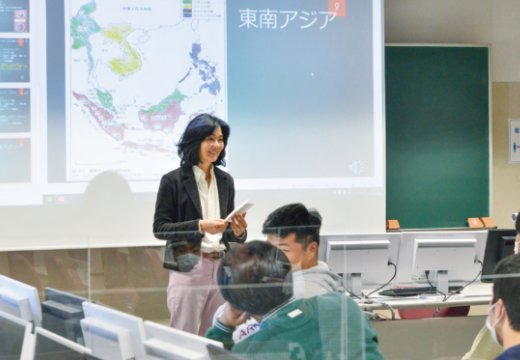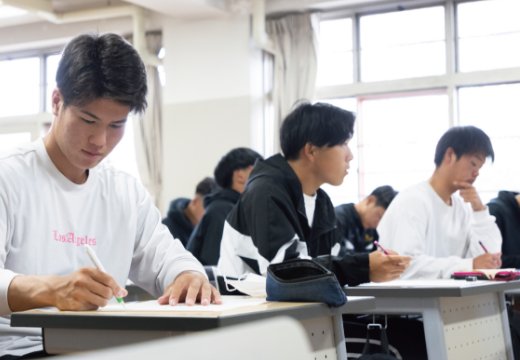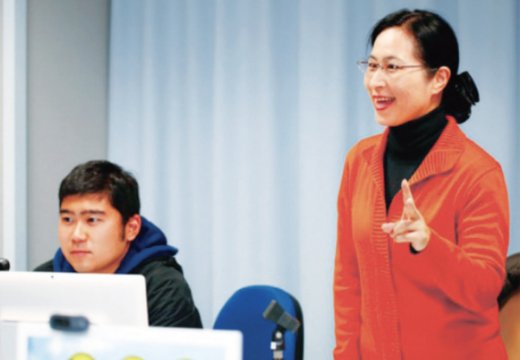Faculty of International Studies Department of Foreign Languages Become a Specialist in a Language in High Demand
English translation in progress. Thank you for waiting.
Contents
Department Overview
Students choose one of seven high-demand languages in the era of globalization and develop their proficiency through focused study. By combining language skills with cultural and regional knowledge, they aim to play active roles both in Japan and abroad.
Key learning points of each major
Thai Language Major
The number of Thai tourists visiting Japan has been increasing each year, creating a dynamic of mutual exchange between Japanese and Thai people. Since very few Japanese people can read and write Thai, acquiring Thai language skills opens up promising career opportunities in a wide range of fields related to Japan–Thailand relations, including employment at Japanese companies operating in Thailand.
Indonesian Language Major
Indonesia, the world’s fourth most populous country, is home to many Japanese companies, and the number of Indonesians coming to Japan for work, study, and tourism is rapidly increasing. By learning Indonesian—a language known for its relatively simple grammar and pronunciation—students can gain valuable opportunities to play active roles both in Japan and around the world.
German Language Major
Germany’s commitment to renewable energy and its proactive approach to accepting refugees offer many valuable lessons about building a sustainable and inclusive society. Studying the German language, as well as German society and culture, helps cultivate the ability to think critically and act toward creating a better society.
French Language Major
French is spoken as a native language by approximately 120 million people worldwide, and by over 300 million people when including those who use it as an official or primary foreign language. Acquiring French language skills opens up opportunities not only in French society but also across the wider French-speaking world, including many countries in Africa.
Russian Language Major
Russia plays an essential role in understanding today’s world. The affiliated Tenri Central Library and Sankokan Museum house a wealth of valuable materials related to Russia, and we actively engage in exchange programs with our partner institutions there. By improving your Russian language skills and gaining deeper insight into Russian society and culture, you will develop new perspectives on the world.
Spanish Language Major
Spanish is spoken as a native language by approximately 500 million people worldwide, and there are about 80,000 Spanish-speaking people living in Japan. With a strong tradition and proven track record in Spanish language education, this course equips students with practical Spanish skills, a global mindset, and the ability to engage in multicultural settings—opening up diverse career opportunities both in Japan and abroad.
Brazilian-Portuguese Language Major
Brazil is a multiethnic and multicultural nation. Learning Portuguese, its official language, is the first step toward understanding Brazil’s history, society, and culture, and gaining a broader perspective on multicultural coexistence. It also helps cultivate the ability to contribute to harmonious living with the approximately 200,000 Brazilians residing in Japan.
Enrollment models and qualification models to make the most of your learning for the future
Enrollment model for students aiming for careers in international relations and global cooperation
This enrollment model is designed for those who aspire to work in international fields as diplomats, as dispatched personnel to Japanese diplomatic missions overseas, or in multinational corporations.
- Future vision: multinational company employee, diplomats and dispatched personnel to Japanese diplomatic missions overseas, NPO/NGO Workers, and Tenrikyo overseas missionaries
Enrollment model for students aiming for careers in tourism hospitality
This enrollment model is designed for students who wish to pursue careers in the tourism industry by utilizing their language skills, communication abilities, and sense of hospitality.
- Future vision: Airline or travel agency staff, hotel personnel, licensed tour guides
Enrollment model for students aiming for careers as a foreign language specialist
This enrollment model is intended for students aiming to pursue careers that demand advanced language proficiency—such as translation and interpreting—or to further their academic studies at the graduate level.
- Future vision: Translators and interpreters, government or corporate employees requiring strong foreign language skills, graduate school, Japanese language teachers, and professionals in the information and communication (IT) industry.
“Spanish language teacher” qualification model
This qualification model is designed for students aiming to become high school Spanish teachers by obtaining the First Class High School Teaching License in Spanish.
Note: Students who wish to acquire a Spanish teaching license must meet specific requirements set by the program.
- Future vision: High school Spanish teacher
Four-year learning process
First-year
続きを読むBuilding a Foundation of Language Skills and Basic Knowledge
While developing basic skills in reading, writing, listening, and speaking, students also gain basic knowledge about the countries and regions where their chosen major language is spoken.
Representative Classes
 ・Introduction to Thai Studies
・Introduction to Thai Studies
Students explore the geography, history, society, and culture of Thailand, identify topics of personal interest through comparisons with Japan, and develop skills in gathering information from both academic literature and digital sources.
Second-year
続きを読むEnhancing Language Skills and Deepening Regional Understanding
In language classes, students develop basic communication skills, reading and writing proficiency, and the ability to gather and analyze information, while deepening their understanding of different countries and regions.
Representative Classes
 ・Society and Culture in Germany
・Society and Culture in Germany
Building on basic knowledge of German society and culture, students examine contemporary issues in Germany—such as the East–West disparity, energy challenges, the refugee crisis, and population decline—while also drawing comparisons with Japan.
Third-year
続きを読むEngaging in intercultural exchange using advanced language skills
While aiming to develop smooth and effective communication skills based on advanced language proficiency, students also begin preparing for their graduation thesis.
Representative Classes
 ・Japanese Culture in Brazilian-Portuguese
・Japanese Culture in Brazilian-PortugueseStudents will deepen their understanding of Japanese culture—from traditional arts to contemporary animation—and acquire advanced Portuguese proficiency along with the ability to accurately communicate Japanese cultural concepts to Portuguese-speaking people.
Fourth-year
続きを読むWork on a graduation thesis as the culmination of your studies
【Examples of graduation thesis themes】
- The Challenges and Possible Solutions for Plastic Recycle in Thailand
タイにおけるプラスチックリサイクル問題とその改善策 - The Development of Tourism in Bali, Indonesia: Present Conditions and Future Outlook
インドネシアのバリ島における観光開発:現状と今後の展望 - A Comparative Study of Nuclear Energy Policies in Germany and Japan
ドイツと日本の原子力政策 - French Society Seen Through Chanson
シャンソンを通して見るフランス社会 - The Majestic Art of Russian Ballet: From Its Origins to the Present and Into the Future
華麗なるロシアバレエ —その起こりから現在、そして未来へ—
- The Challenges and Possible Solutions for Plastic Recycle in Thailand
Available Qualifications
- First Class High School Teaching License in Spanish
- Qualification for appointment as a social welfare administrator
- Librarian
- Museum curator
- Japanese language teacher
- Corrections and Rehabilitation
- Missionary of the Tenrikyo Church
Faculty list
Curriculum
Curriculum tree(PDF)
Curriculum map(PDF)
Education Policy
Admission Policy
In order to fulfill the educational goals of the Department of Foreign Studies, we seek for students with the following qualities:
1. (Internationality, Diversity) Those who are interested in “international awareness,” which is one of Tenri University’s core educational principles.
2. (Knowledge) Those who are interested in the languages, cultures, and societies of the countries and regions where the course languages—Thai, Indonesian, German, French, Russian, Spanish, or Brazilian Portuguese—are spoken.
3. (Thought, Decision, Expression) Those who are interested in academic fields such as language, literature, culture, and society.
4. (Communication, Skills, Expression) Those who are interested in communication using a foreign
language (in their chosen major language).
5. (Independence, Diversity) Those who aspire to use a foreign language (in their chosen major
language) in their future careers or activities.
6. (Contribution, Independence, Diversity) Those who aspire to serve as a bridge between Japan and the world through the use of foreign language (in their chosen major language).
7. (Contribution, Independence, Diversity, Collaboration) Those who have a strong interest in foreign language (in their chosen major language), and have actively participated in social or extracurricular activities.
Entrance examination methods will take various forms, such as comprehensive selection, special
selection, school recommended selection, general selection, and transfer selection.Curriculum Policy
The curriculum is systematically designed to allow students to pursue specialized academic studies in the fields related to culture and society, building on their language proficiency in their chosen major language—Thai, Indonesian, German, French, Russian, Spanish, or Brazilian Portuguese.
It is designed to develop students’ language proficiency in stages: introductory subjects in the first year, basic subjects in the second year, and advanced subjects in the third and fourth years. These subjects systematically build communication skills, reading and writing abilities, and skills in information gathering and analysis. In addition, seminars in the third and fourth years prepare students for their graduation thesis or final research project, serving as a culmination of their studies.
In order to improve language skills and gain international experience, students take part in a three-
week language study program conducted in a country or region where the language of their major is used.Diploma Policy
A bachelor’s degree (Thai, Indonesian, German, French, Russian, Spanish, or Brazilian Portuguese)
will be awarded to students who have acquired the following knowledge and abilities:
1. (Internationality, Diversity) Those who have acquired “international awareness,” in line with one of Tenri University’s core educational principles.
2. (Knowledge, Skill) Those who have acquired the knowledge of the language, culture, and society of countries or regions where the language of their chosen major (Thai, Indonesian, German, French, Russian, Spanish, or Brazilian Portuguese) is spoken and have developed the ability to gather relevant information.
3. (Thought, Decision, Expression) Those who are able to pursue advanced academic studies in fields such as linguistics, literature, culture, and society, based on proficiency of their chosen major language.
4. (Communication, Skill, Expression) Those who are able to communicate in their chosen major language with an understanding of different cultures.
5. (Knowledge, Skill, Independence, Diversity) Those who are able to apply their chosen major language and succeed in a wide range of fields.
6. (Contribution, Independence, Diversity, Collaboration) Those who are able to contribute to local and international communities and various organizations by serving as a bridge between Japan and the world through the proficient use of internationally applicable foreign language (in their chosen major).

 ・Introduction to Thai Studies
・Introduction to Thai Studies ・Society and Culture in Germany
・Society and Culture in Germany ・Japanese Culture in Brazilian-Portuguese
・Japanese Culture in Brazilian-Portuguese